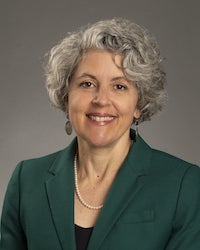
Office: MB 245-A
(208) 426-1829
lauriecavey@boisestate.edu
About
Laurie joined the Department of Mathematics in 2009. Prior to her employment at Boise State, Dr. Cavey was an Associate Professor at James Madison University where she received an award for excellence in teaching and scholarship. She thoroughly enjoys teaching mathematics courses for future teachers as well as opportunities to lead workshops with and for classroom teachers.
In the scholarly realm, Laurie studies the specialized knowledge of mathematics needed to teach concepts related to algebra, functions, and mathematical modeling. She is currently leading a project that is working to leverage the examination of students’ mathematical ideas to transform the way we educate teachers. For more information about her current project, known as VCAST (Video Case Analysis of Student Thinking), follow the link to the project website.
Selected products
- Cavey, L. O., Totorica, T., & Lowenthal, P. (accepted). Students’ unconventional graphical representations of covariational reasoning. The 14th International Congress on Mathematical Education. Shanghai, China.
- Mo, Y., Carney, M., Cavey, L. O., Totorica, T. (accepted). Using think-alouds for response process evidence of teacher attentiveness. Journal of Applied Measurement in Education.
- Cavey, L. O., Libberton, J., Totorica, T., Carney, M., Lowenthal, P. (2020). VCAST learning modules: A functions & modeling course innovation. In Preparing STEM teachers: A replication model.
- Carney, M. B., Totorica, T., Cavey, L. O., & Lowenthal, P. R. (2019). Developing a construct map for teacher candidate attentiveness. In J. D. Bostic, E. E. Krupa, & J. C. Shih (Eds.), Quantitative measures of mathematical knowledge: Researching instruments and perspectives (pp. 152-178). New York, NY: Routledge.
- Carney, M., Cavey, L. O., Hughes, G. (2017) Assessing teacher attentiveness to student mathematical thinking: Validity claims and evidence. Elementary School Journal, 118(2), pp. 281-309.
Selected courses taught
- MATH 211 Geometry for the Classroom
- MATH 250 Algebraic & Proportional Reasoning for Teachers
- MATH 370 Functions & Modeling